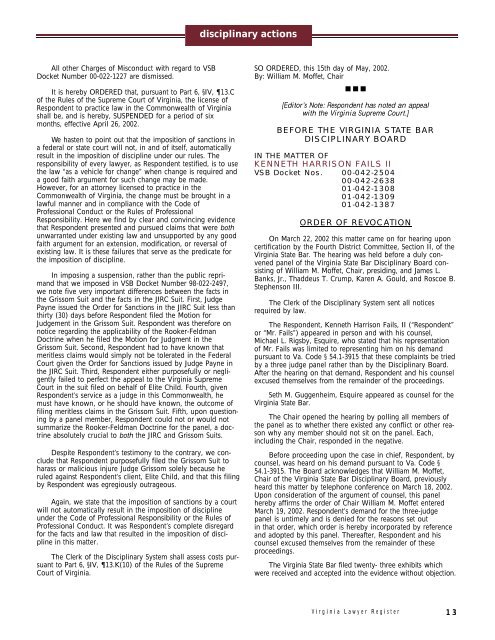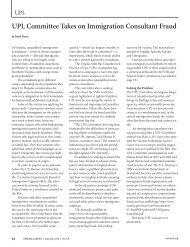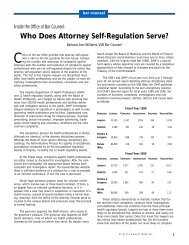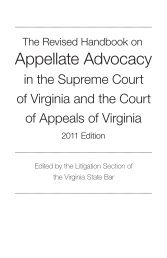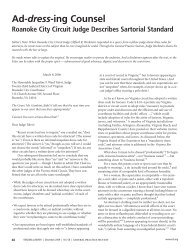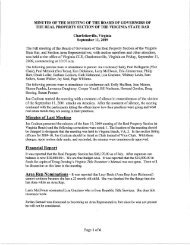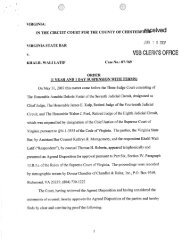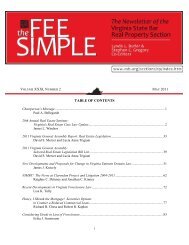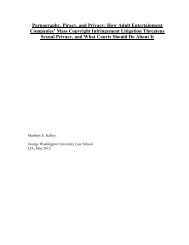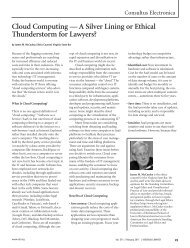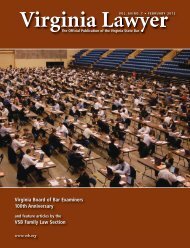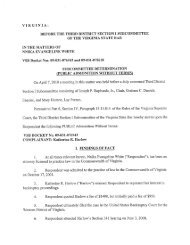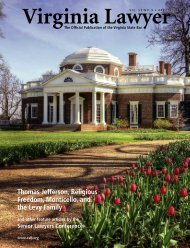Disciplinary Board Disciplinary Actions - Virginia State Bar
Disciplinary Board Disciplinary Actions - Virginia State Bar
Disciplinary Board Disciplinary Actions - Virginia State Bar
You also want an ePaper? Increase the reach of your titles
YUMPU automatically turns print PDFs into web optimized ePapers that Google loves.
All other Charges of Misconduct with regard to VSB<br />
Docket Number 00-022-1227 are dismissed.<br />
It is hereby ORDERED that, pursuant to Part 6, §IV, 13.C<br />
of the Rules of the Supreme Court of <strong>Virginia</strong>, the license of<br />
Respondent to practice law in the Commonwealth of <strong>Virginia</strong><br />
shall be, and is hereby, SUSPENDED for a period of six<br />
months, effective April 26, 2002.<br />
We hasten to point out that the imposition of sanctions in<br />
a federal or state court will not, in and of itself, automatically<br />
result in the imposition of discipline under our rules. The<br />
responsibility of every lawyer, as Respondent testified, is to use<br />
the law “as a vehicle for change” when change is required and<br />
a good faith argument for such change may be made.<br />
However, for an attorney licensed to practice in the<br />
Commonwealth of <strong>Virginia</strong>, the change must be brought in a<br />
lawful manner and in compliance with the Code of<br />
Professional Conduct or the Rules of Professional<br />
Responsibility. Here we find by clear and convincing evidence<br />
that Respondent presented and pursued claims that were both<br />
unwarranted under existing law and unsupported by any good<br />
faith argument for an extension, modification, or reversal of<br />
existing law. It is these failures that serve as the predicate for<br />
the imposition of discipline.<br />
In imposing a suspension, rather than the public reprimand<br />
that we imposed in VSB Docket Number 98-022-2497,<br />
we note five very important differences between the facts in<br />
the Grissom Suit and the facts in the JIRC Suit. First, Judge<br />
Payne issued the Order for Sanctions in the JIRC Suit less than<br />
thirty (30) days before Respondent filed the Motion for<br />
Judgement in the Grissom Suit. Respondent was therefore on<br />
notice regarding the applicability of the Rooker-Feldman<br />
Doctrine when he filed the Motion for Judgment in the<br />
Grissom Suit. Second, Respondent had to have known that<br />
meritless claims would simply not be tolerated in the Federal<br />
Court given the Order for Sanctions issued by Judge Payne in<br />
the JIRC Suit. Third, Respondent either purposefully or negligently<br />
failed to perfect the appeal to the <strong>Virginia</strong> Supreme<br />
Court in the suit filed on behalf of Elite Child. Fourth, given<br />
Respondent’s service as a judge in this Commonwealth, he<br />
must have known, or he should have known, the outcome of<br />
filing meritless claims in the Grissom Suit. Fifth, upon questioning<br />
by a panel member, Respondent could not or would not<br />
summarize the Rooker-Feldman Doctrine for the panel, a doctrine<br />
absolutely crucial to both the JIRC and Grissom Suits.<br />
Despite Respondent’s testimony to the contrary, we conclude<br />
that Respondent purposefully filed the Grissom Suit to<br />
harass or malicious injure Judge Grissom solely because he<br />
ruled against Respondent’s client, Elite Child, and that this filing<br />
by Respondent was egregiously outrageous.<br />
Again, we state that the imposition of sanctions by a court<br />
will not automatically result in the imposition of discipline<br />
under the Code of Professional Responsibility or the Rules of<br />
Professional Conduct. It was Respondent’s complete disregard<br />
for the facts and law that resulted in the imposition of discipline<br />
in this matter.<br />
The Clerk of the <strong>Disciplinary</strong> System shall assess costs pursuant<br />
to Part 6, §IV, 13.K(10) of the Rules of the Supreme<br />
Court of <strong>Virginia</strong>.<br />
disciplinary actions<br />
SO ORDERED, this 15th day of May, 2002.<br />
By: William M. Moffet, Chair<br />
■ ■ ■<br />
[Editor’s Note: Respondent has noted an appeal<br />
with the <strong>Virginia</strong> Supreme Court.]<br />
BEFORE THE VIRGINIA STATE BAR<br />
DISCIPLINARY BOARD<br />
IN THE MATTER OF<br />
KENNETH HARRISON FAILS II<br />
VSB Docket Nos. 00-042-2504<br />
00-042-2638<br />
01-042-1308<br />
01-042-1309<br />
01-042-1387<br />
ORDER OF REVOCATION<br />
On March 22, 2002 this matter came on for hearing upon<br />
certification by the Fourth District Committee, Section II, of the<br />
<strong>Virginia</strong> <strong>State</strong> <strong>Bar</strong>. The hearing was held before a duly convened<br />
panel of the <strong>Virginia</strong> <strong>State</strong> <strong>Bar</strong> <strong>Disciplinary</strong> <strong>Board</strong> consisting<br />
of William M. Moffet, Chair, presiding, and James L.<br />
Banks, Jr., Thaddeus T. Crump, Karen A. Gould, and Roscoe B.<br />
Stephenson III.<br />
The Clerk of the <strong>Disciplinary</strong> System sent all notices<br />
required by law.<br />
The Respondent, Kenneth Harrison Fails, II (“Respondent”<br />
or “Mr. Fails”) appeared in person and with his counsel,<br />
Michael L. Rigsby, Esquire, who stated that his representation<br />
of Mr. Fails was limited to representing him on his demand<br />
pursuant to Va. Code § 54.1-3915 that these complaints be tried<br />
by a three judge panel rather than by the <strong>Disciplinary</strong> <strong>Board</strong>.<br />
After the hearing on that demand, Respondent and his counsel<br />
excused themselves from the remainder of the proceedings.<br />
Seth M. Guggenheim, Esquire appeared as counsel for the<br />
<strong>Virginia</strong> <strong>State</strong> <strong>Bar</strong>.<br />
The Chair opened the hearing by polling all members of<br />
the panel as to whether there existed any conflict or other reason<br />
why any member should not sit on the panel. Each,<br />
including the Chair, responded in the negative.<br />
Before proceeding upon the case in chief, Respondent, by<br />
counsel, was heard on his demand pursuant to Va. Code §<br />
54.1-3915. The <strong>Board</strong> acknowledges that William M. Moffet,<br />
Chair of the <strong>Virginia</strong> <strong>State</strong> <strong>Bar</strong> <strong>Disciplinary</strong> <strong>Board</strong>, previously<br />
heard this matter by telephone conference on March 18, 2002.<br />
Upon consideration of the argument of counsel, this panel<br />
hereby affirms the order of Chair William M. Moffet entered<br />
March 19, 2002. Respondent’s demand for the three-judge<br />
panel is untimely and is denied for the reasons set out<br />
in that order, which order is hereby incorporated by reference<br />
and adopted by this panel. Thereafter, Respondent and his<br />
counsel excused themselves from the remainder of these<br />
proceedings.<br />
The Vi rginia <strong>State</strong> <strong>Bar</strong> filed twenty- three exhibits which<br />
w e re received and accepted into the evidence without objection.<br />
V i r g i n i a L a w y e r R e g i s t e r 1 3


